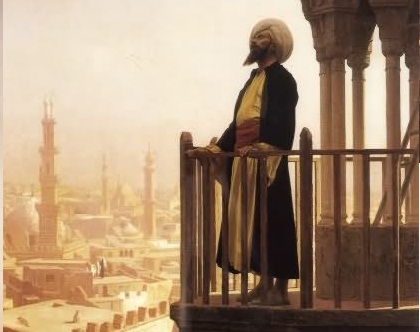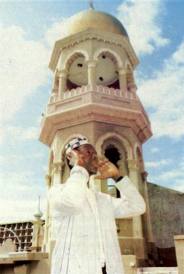(1).jpg)
THE COMMON PASSWORD OF MUSLIMS
The adhan is a common password among the Muslims of the world. At every moment, in every place on earth, the adhan is being recited.
It has become a tradition for muezzins, when performing the call to prayer in mosques with congregation, to remember Bilal al-Habashi with reverence as the master of all muezzins. In some mosques, the blind companion Abdullah ibn Umm Maktum is also mentioned. But there was another muezzin of the Prophet Muhammad (peace be upon him), whose name, for some reason, few know or mention. He is Abu Mahdhura. Abu Mahdhura also has an interesting story.

Did We Not Exalt Your Name?
The adhan is the common password that invites the Muslims of the world to the mosque. It is recited in Arabic from an elevated place at every time of prayer. It was commanded by the Prophet (peace be upon him) to be recited with its current words. In history, the first and only time that the adhan was banned from being recited in its original form in Arabic was in Turkey in 1932; this prohibition, which deeply outraged the Muslims, ended in 1950.
Interestingly, as each meridian is crossed westward, the prayer time advances by 4 minutes, and thus the adhan for the same prayer time is recited again, one minute later, each time. At every moment, in every place on earth, the adhan is heard and the name of the Prophet Muhammad is mentioned. In this way, the truth of the words addressed to the Prophet in the Qur'an, “Did We not exalt your name?” becomes manifest.
When the adhan is recited, those who are able go to the mosque. Those who, due to an excuse, cannot go, listen to the adhan with reverence and repeat its phrases. When the adhan was being recited, Abu Bakr al-Siddiq, upon hearing the name of the Prophet, would kiss the nails of both of his thumbs and rub them on his eyes. When he was asked, “Why did you do that?” he replied, “To seek blessings with your blessed name, O Messenger of Allah.” The Prophet approved of these words and said, “You did well. Whoever does so will not suffer from eye pain.” It has become a tradition that even those who have no relation to prayer or supplication still show respect to the adhan.
What a Beautiful Voice You Have!
The Prophet Muhammad had four muezzins: Bilal al-Habashi, Ibn Umm Maktum, Sa’d ibn Abid Kurazi, and Abu Mahdhura Aws ibn Mi’yar al-Jumahi al-Makki. Sa’d gave the adhan in Quba (the Mosque of Quba, near Medina). Bilal did not perform tarji' in the adhan, meaning he did not lower and raise his voice. In the iqamah (the second call to prayer before starting the congregational prayer), he recited the takbirs (Allahu Akbar) twice each, and the phrases hayya ‘ala as-salah (come to prayer) and hayya ‘ala al-falah (come to success) once each. Abu Mahdhura performed tarji' in the adhan, recited the initial takbirs in the iqamah four times each, and hayya ‘ala as-salah and hayya ‘ala al-falah twice each. Imam Abu Hanifa and the scholars of Iraq practiced according to Bilal’s adhan and Abu Mahdhura’s iqamah; Imam al-Shafi'i and the scholars of Mecca practiced according to Abu Mahdhura’s adhan and Bilal’s iqamah; Imam Ahmad ibn Hanbal practiced according to Bilal’s adhan and iqamah; Imam Malik recited hayya ‘ala as-salah and hayya ‘ala al-falah twice each in the takbir and iqamah.
Abu Mahdhura, whose iqamah the Hanafis followed, became acquainted with Islam in the year when Mecca the Noble was conquered. That year, the Prophet Muhammad was returning from the siege of Ta’if to Ji’ranah. When the time for prayer came, the muezzin began to call the adhan. At that time, Abu Mahdhura, who harbored great hatred and enmity toward the Prophet, along with ten young men from the Quraysh, upon hearing the voice of the adhan, hid in a place and mockingly imitated the muezzin, raising their voices loudly in mockery. The Prophet Muhammad, noticing that one among them had a beautiful voice, summoned them and had them each recite the adhan one by one. When Abu Mahdhura recited last, the Prophet greatly admired his voice and taught him the proper way to recite the adhan. Later, when the time for prayer came, he placed his hand on Abu Mahdhura’s head, stroked his forehead, and commanded him to recite the adhan. Abu Mahdhura, although reluctant at first, obeyed this command, after which the Prophet Muhammad gave him some silver coins and prayed for him. Abu Mahdhura’s heart warmed to Islam, and thereupon he became Muslim. He then asked the Prophet to appoint him as the muezzin of the Sacred Mosque in Mecca. The Prophet accepted this request and instructed him to go to ‘Attab ibn Asid, the governor of Mecca, and inform him of his new duty. Until the Prophet Muhammad departed from Mecca, Abu Mahdhura recited the adhan at the Kaaba together with Bilal al-Habashi. The hair on his forehead, which the Prophet had stroked, he never cut. Until his passing in the year 59 (AH), he served as the muezzin in Mecca. After him, his son and grandsons continued to serve as the muezzins of the Masjid al-Haram for centuries. Hadiths have been narrated from Abu Mahdhura, who had a deep knowledge of the Quraysh lineage. His narration concerning the adhan and iqamah is particularly well known. Hanafi Muslims have followed this narration in their practice.

Among the Ja'faris, one of the heretic groups in Islamıc world, after saying twice “Ashhadu anna Muhammadan Rasulullah” (I bear witness that Muhammad is the Messenger of Allah) during the adhan, they also say twice “Ashhadu anna ‘Aliyyan Waliyyullah”, which means: "I bear witness that Ali is the friend (wali) of Allah." After “Hayya ‘ala al-falah”, they say twice “Hayya ‘ala khayr al-‘amal”, meaning: "Come to the best of deeds." They believe that this was recited during the time of the Prophet Muhammad but was removed by Caliph ‘Umar. Moreover, in the dawn (fajr) adhan, they do not say “As-salatu khayrun min an-nawm” ("Prayer is better than sleep"). In the iqamah, the opening “Allahu Akbar” phrases are said twice, and the concluding “La ilaha illallah” is said once. After “Hayya ‘ala khayr al-‘amal”, the phrase “Qad qamatis-salah” ("The prayer has been established") is recited twice.
Önceki Yazılar
-
“FASTING WAS MADE OBLIGATORY ALSO UPON THOSE BEFORE YOU”25.02.2026
-
WHAT WAS THE LAW OF THE OTTOMAN EMPIRE?18.02.2026
-
WOMAN IN THE EASTERN WORLD11.02.2026
-
THE OTTOMAN DYNASTY OWES ITS LIFE TO A WOMAN4.02.2026
-
THE WATER OF IMMORTALITY IN THE “LAND OF DARKNESS”28.01.2026
-
THE WORLD LEARNED WHAT FORBEARANCE IS FROM SULTAN MEHMED II21.01.2026
-
THE RUSH FOR GOLD14.01.2026
-
TRACES OF ISLAM IN CONSTANTINOPOLIS7.01.2026
-
WHO CAN FORGIVE THE KILLER?31.12.2025
-
WHEN WAS PROPHET ISA (JESUS) BORN?24.12.2025